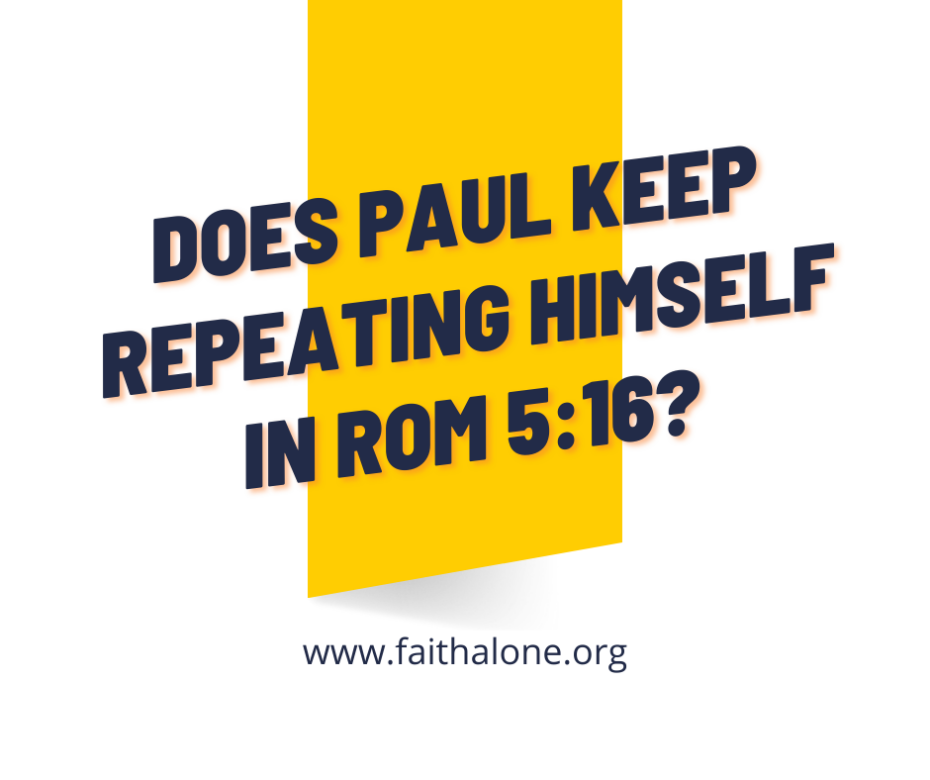The book of Romans is often seen as a book that tells people how to be saved from the lake of fire. Many evangelistic tracts use various verses from the book to tell the unbeliever how to be saved in this regard. When you combine this with the tendency of many people to see the whole NT as being written for that purpose, it’s not surprising that many Christians interpret a large number of verses in Romans as talking about eternal salvation.
It is legitimate to ask if that is always the correct starting place for determining what the NT is teaching. For example, the book of Romans was written to the church at Rome (Rom 1:7). It would be surprising for Paul to write a book to believers telling them how to become believers!
I would like to look at one particular verse in Romans to show how the usual tendency leads to a confusing and even nonsensical interpretation. The verse makes much better sense when understood as addressing people who were already Christians.
In Rom 5:16, Paul says, “For the judgment which came from one offense resulted in condemnation, but the free gift which came from many offenses resulted in justification.” It is very common to hear people say that this verse means that before we believed, we were under judgment. That judgment was that we were condemned to hell. Once we believed, however, we received the free gift of eternal life after receiving justification by faith. As a result, the believer is going to heaven.
There are a number of problems with that common interpretation. First of all, Romans 5–8 is talking about Christian living. But even if, in this particular verse, Paul was simply saying that the believer is going to heaven and is saved from hell, he would be redundant. He would be saying that as unbelievers we were under judgment (going to hell), and this judgment resulted in condemnation (going to hell). Then we received the gift of eternal life (going to heaven) and this resulted in justification (going to heaven). To me, that makes no sense.
There is a better way to look at this verse. Zane Hodges has a great discussion of it in his book, Romans: Deliverance from God’s Wrath, which is available at the GES website. He points out that the words judgment and condemnation in Greek (and English!) are different words. It is natural to conclude that they do not refer to the same thing. The judgment Paul speaks of is that in Adam we all die physically. That is the result of Adam’s sin. The condemnation is that as unbelievers we are enslaved to the sin that works in our dead bodies. We must serve sin. That is how sin impacts us now.
The free gift we receive at faith is our justification (Rom 3:24). The Greek word used for justification in 5:16 is different from the word Paul uses for justification earlier in the book. It means righteous actions or deeds. The word means that after being declared righteous by God (justified), the believer can now produce righteous actions.
There is a parallel here. As unbelievers, we were under the judgment of death that sin brings. This resulted in being enslaved to the power of sin. When we believed, we were declared righteous as a gift from God. This allows us to live righteously. That is the result of our justification.
Of course, this is not automatic. The believer must walk by the power of the Spirit. But this is the topic of Romans 5–8 (Rom 8:12-13). What a difference it makes in interpreting a verse like Rom 5:16 when we understand that Romans is written to believers to tell them how to live. Paul is not telling believers they are going to heaven (they already knew that); he is telling them that they can experience life here and now.
Paul is presenting profound truths in this verse. In Christ, the believer has been set free from the power of sin (condemnation). He no longer has to serve it. Because, as a free gift, we have His Spirit and have been declared righteous by God, we can produce righteous actions by His power in us.
This is not a minor issue. It is long past time for Christian teachers to rightly divide the Word of God. When we think that a book like Romans is telling people how to escape hell, we rob them of the book’s wonderful doctrines for believers. Instead, we can tell them how to escape the power of sin, with which all of us are very familiar.


